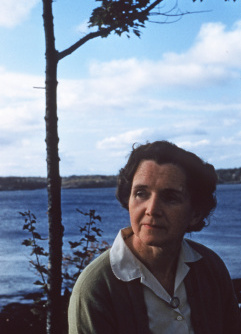Rachel Carson was a friend of mine, although she died when I was only 11 years old.
If you’re not a baby boomer or older, you may not know her name. You may not know that she was a best-selling author in the 1950s and 1960s, or that her work as a scientist and writer led to the nationwide banning of DDT and the beginning of the environmental movement.
Recently, the Public Broadcasting System’s “American Experience” aired a film about Rachel Carson’s life and work. If you view it, you’ll learn that the most important revolution she engaged in involved more than stopping pollution by pesticides. She was as concerned with halting heedless interference with interrelationships in the natural world, including those among humans. She was concerned about government’s relationship with the public, businesses’ responsibility toward consumers, the contamination of human discourse by falsehood. Sound familiar from the headlines, posts and tweets of today?
Rachel Carson came into my life when she built a summer place near my grandparents’ cottage on the Maine coast. She and my grandmother became dear friends. As a youngster, I was along for parts of their journey. As an adult, through reading the letters to each other these friends saved, Rachel Carson became closer to me.
I saw, as she did, that the web of human relations, embedded in human nature, is as crucial to our world’s well-being as any other set of environmental links. To pollute that web is as toxic as pouring poison into a river.
And that web is being fouled today. Self-righteousness, the outlook of might making right, grandiosity in the face of humbling challenges are ascendant. These responses took root in the soil of economic turmoil and human dislocations.
It’s natural for people to fear unsettling change. We’re as motivated by our biology as any plant or animal experiencing a threat. Our brains wire us to feel fear, anger, and sadness as we cope. But it’s stupid, and human evolution shows this, for those emotions to rule when we’re challenged.
Modern humans best overcome threats when deploying empathy, whether toward allies or adversaries. If you can’t put yourself in the other fellow’s shoes, you’re missing out on rational and emotional intelligence. It’s intelligence that forms coalitions in the home, at work, across all forms of human relations and leads to progress.
Brittle and brute tactics are not a mature, or ultimately successful, response to human problems. These approaches may appear to bring success in the short term. Using them may generate feelings of slights vindicated. But in their wake, the whole of which we each are a part will eventually wither. The long term will not be healthful for our children and other living things.
Having empathy, valuing the intricate web of human relationships, is not the stance of cowards. It’s the essence of courage. Rachel Carson faced disparagement from private enterprise, media and public officials. A gentle and petite woman, she stood with backbone against detractors, employing her most effective tools: facts, understanding, caring, calmness.
In 1962, in one of her last public presentations before her death, Rachel Carson spoke at the Scripps College commencement. Her groundbreaking book, “Silent Spring,” had just been published. She continued its theme of environmental interdependence in her remarks, but broadened the context:
“Your generation must face realities instead of taking refuge in ignorance and evasion of truth. Yours is a grave and a sobering responsibility, but it is also a shining opportunity. You go out into a world where mankind is challenged, as it has never been challenged before, to prove its maturity and mastery – not of nature but of itself.”
It’s time to take up Rachel Carson’s challenge again. We must reward mature behavior and remove our attention from immature distractions, as mothers do when their kids are acting out. We must expand our circles of affection, as young people have done. We must prove the masters of our fear, anger and any anxious interest in belittling others.
Humans naturally advance in community. Our sense of community evolves. As it has, life has become better for the human family. Only a short-sighted, impulsive and immature perspective seeks to break rather than strengthen our bonds. As Rachel Carson taught, everything in nature is interrelated and interdependent – including all of us. As we care for our environment, so must we care for all humankind. It’s a fact that we can’t escape being on this earth together.
Send questions/comments to the editors.



Comments are no longer available on this story